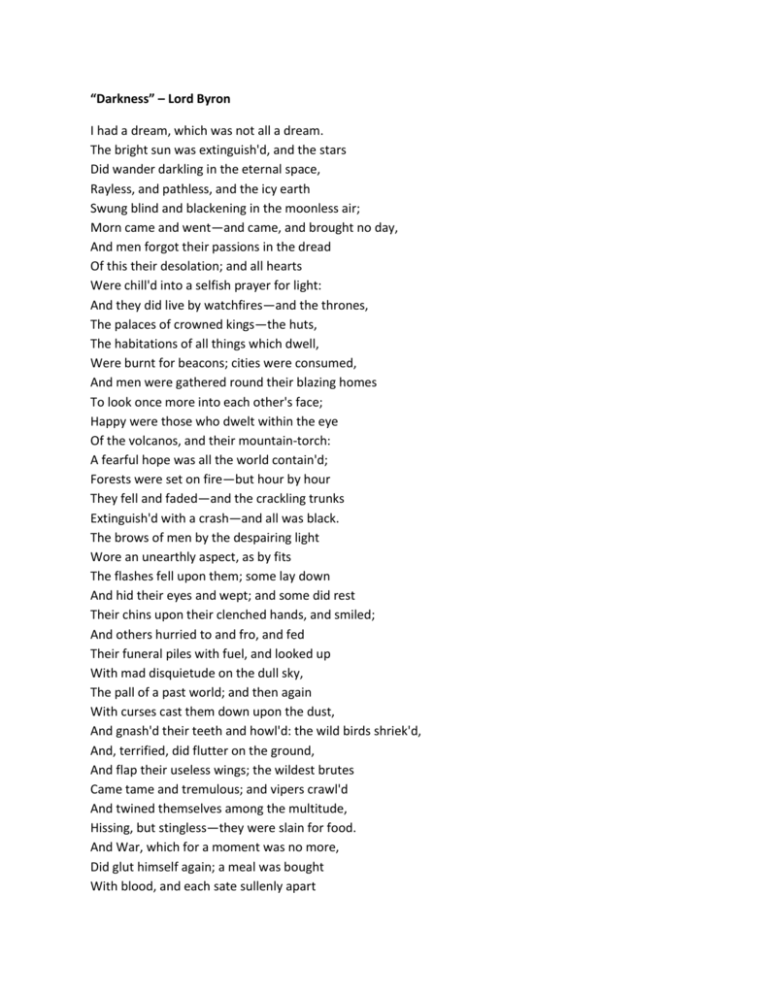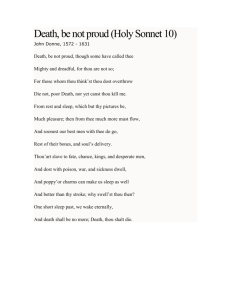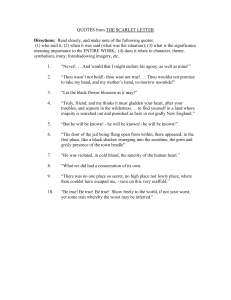Second-Generation Romanticism
advertisement

“Darkness” – Lord Byron I had a dream, which was not all a dream. The bright sun was extinguish'd, and the stars Did wander darkling in the eternal space, Rayless, and pathless, and the icy earth Swung blind and blackening in the moonless air; Morn came and went—and came, and brought no day, And men forgot their passions in the dread Of this their desolation; and all hearts Were chill'd into a selfish prayer for light: And they did live by watchfires—and the thrones, The palaces of crowned kings—the huts, The habitations of all things which dwell, Were burnt for beacons; cities were consumed, And men were gathered round their blazing homes To look once more into each other's face; Happy were those who dwelt within the eye Of the volcanos, and their mountain-torch: A fearful hope was all the world contain'd; Forests were set on fire—but hour by hour They fell and faded—and the crackling trunks Extinguish'd with a crash—and all was black. The brows of men by the despairing light Wore an unearthly aspect, as by fits The flashes fell upon them; some lay down And hid their eyes and wept; and some did rest Their chins upon their clenched hands, and smiled; And others hurried to and fro, and fed Their funeral piles with fuel, and looked up With mad disquietude on the dull sky, The pall of a past world; and then again With curses cast them down upon the dust, And gnash'd their teeth and howl'd: the wild birds shriek'd, And, terrified, did flutter on the ground, And flap their useless wings; the wildest brutes Came tame and tremulous; and vipers crawl'd And twined themselves among the multitude, Hissing, but stingless—they were slain for food. And War, which for a moment was no more, Did glut himself again; a meal was bought With blood, and each sate sullenly apart Gorging himself in gloom: no love was left; All earth was but one thought—and that was death, Immediate and inglorious; and the pang Of famine fed upon all entrails—men Died, and their bones were tombless as their flesh; The meagre by the meagre were devoured, Even dogs assail'd their masters, all save one, And he was faithful to a corse, and kept The birds and beasts and famish'd men at bay, Till hunger clung them, or the dropping dead Lured their lank jaws; himself sought out no food, But with a piteous and perpetual moan, And a quick desolate cry, licking the hand Which answered not with a caress—he died. The crowd was famish'd by degrees; but two Of an enormous city did survive, And they were enemies: they met beside The dying embers of an altar-place Where had been heap'd a mass of holy things For an unholy usage; they raked up, And shivering scraped with their cold skeleton hands The feeble ashes, and their feeble breath Blew for a little life, and made a flame Which was a mockery; then they lifted up Their eyes as it grew lighter, and beheld Each other's aspects—saw, and shriek'd, and died— Even of their mutual hideousness they died, Unknowing who he was upon whose brow Famine had written Fiend. The world was void, The populous and the powerful—was a lump, Seasonless, herbless, treeless, manless, lifeless— A lump of death—a chaos of hard clay. The rivers, lakes, and ocean all stood still, And nothing stirred within their silent depths; Ships sailorless lay rotting on the sea, And their masts fell down piecemeal: as they dropp'd They slept on the abyss without a surge— The waves were dead; the tides were in their grave, The moon their mistress had expir'd before; The winds were withered in the stagnant air, And the clouds perish'd; Darkness had no need Of aid from them—She was the Universe. “Hymn to Intellectual Beauty” – Percy Bysshe Shelley I THE AWFUL shadow of some unseen Power Floats though unseen among us,—visiting This various world with as inconstant wing As summer winds that creep from flower to flower,— Like moonbeams that behind some piny mountain shower, It visits with inconstant glance Each human heart and countenance; Like hues and harmonies of evening,— Like clouds in starlight widely spread,— Like memory of music fled,— Like aught that for its grace may be Dear, and yet dearer for its mystery. 5 10 II Spirit of BEAUTY, that dost consecrate With thine own hues all thou dost shine upon Of human thought or form,—where art thou gone? Why dost thou pass away and leave our state, This dim vast vale of tears, vacant and desolate? Ask why the sunlight not for ever Weaves rainbows o’er yon mountain-river, Why aught should fail and fade that once is shown, Why fear and dream and death and birth Cast on the daylight of this earth Such gloom,—why man has such a scope For love and hate, despondency and hope? III No voice from some sublimer world hath ever To sage or poet these responses given— Therefore the names of Demon, Ghost, and Heaven, Remain the records of their vain endeavour, Frail spells—whose uttered charm might not avail to sever, From all we hear and all we see, Doubt, chance, and mutability. Thy light alone—like mist o’er mountains driven, Or music by the night-wind sent Through strings of some still instrument, Or moonlight on a midnight stream, Gives grace and truth to life’s unquiet dream. 15 20 25 30 35 IV Love, Hope, and Self-esteem, like clouds depart And come, for some uncertain moments lent. Man were immortal, and omnipotent, Didst thou, unknown and awful as thou art, Keep with thy glorious train firm state within his heart. Thou messenger of sympathies, That wax and wane in lovers’ eyes— Thou—that to human thought art nourishment, Like darkness to a dying flame! Depart not as thy shadow came, Depart not—lest the grave should be, Like life and fear, a dark reality. 40 45 V While yet a boy I sought for ghosts, and sped Through many a listening chamber, cave and ruin, And starlight wood, with fearful steps pursuing Hopes of high talk with the departed dead. I called on poisonous names with which our youth is fed; I was not heard—I saw them not— When musing deeply on the lot Of life, at that sweet time when winds are wooing All vital things that wake to bring News of birds and blossoming,— Sudden, thy shadow fell on me; I shrieked, and clasped my hands in ecstasy! 50 55 60 VI I vowed that I would dedicate my powers To thee and thine—have I not kept the vow? With beating heart and streaming eyes, even now I call the phantoms of a thousand hours Each from his voiceless grave: they have in visioned bowers Of studious zeal or love’s delight Outwatched with me the envious night— They know that never joy illumed my brow Unlinked with hope that thou wouldst free This world from its dark slavery, That thou—O awful LOVELINESS, Wouldst give whate’er these words cannot express. 65 70 VII The day becomes more solemn and serene When noon is past—there is a harmony In autumn, and a lustre in its sky, Which through the summer is not heard or seen, As if it could not be, as if it had not been! Thus let thy power, which like the truth Of nature on my passive youth Descended, to my onward life supply Its calm—to one who worships thee, And every form containing thee, Whom, SPIRIT fair, thy spells did bind To fear himself, and love all human kind. “Ozymandias” – Percy Bysshe Shelley I met a traveller from an antique land, Who said—“Two vast and trunkless legs of stone Stand in the desert. . . . Near them, on the sand, Half sunk a shattered visage lies, whose frown, And wrinkled lip, and sneer of cold command, Tell that its sculptor well those passions read Which yet survive, stamped on these lifeless things, The hand that mocked them, and the heart that fed; And on the pedestal, these words appear: My name is Ozymandias, King of Kings; Look on my Works, ye Mighty, and despair! Nothing beside remains. Round the decay Of that colossal Wreck, boundless and bare The lone and level sands stretch far away.” 75 80 “On First Looking Into Chapman’s Homer” – John Keats MUCH have I travell'd in the realms of gold, And many goodly states and kingdoms seen; Round many western islands have I been Which bards in fealty to Apollo hold. Oft of one wide expanse had I been told That deep-brow'd Homer ruled as his demesne: Yet did I never breathe its pure serene Till I heard Chapman speak out loud and bold: Then felt I like some watcher of the skies When a new planet swims into his ken; Or like stout Cortez, when with eagle eyes He stared at the Pacific—and all his men Look'd at each other with a wild surmise— Silent, upon a peak in Darien. 5 10 “When I Have Fears” – John Keats WHEN I have fears that I may cease to be Before my pen has glean'd my teeming brain, Before high pil`d books, in charact'ry, Hold like rich garners the full-ripen'd grain; When I behold, upon the night's starr'd face, Huge cloudy symbols of a high romance, And feel that I may never live to trace Their shadows, with the magic hand of chance; And when I feel, fair creature of an hour! That I shall never look upon thee more, Never have relish in the faery power Of unreflecting love;—then on the shore Of the wide world I stand alone, and think, Till Love and Fame to nothingness do sink. 5 10 “Ode on a Grecian Urn” – John Keats THOU still unravish'd bride of quietness, Thou foster-child of Silence and slow Time, Sylvan historian, who canst thus express A flowery tale more sweetly than our rhyme: What leaf-fringed legend haunts about thy shape Of deities or mortals, or of both, In Tempe or the dales of Arcady? What men or gods are these? What maidens loth? What mad pursuit? What struggle to escape? What pipes and timbrels? What wild ecstasy? Heard melodies are sweet, but those unheard Are sweeter; therefore, ye soft pipes, play on; Not to the sensual ear, but, more endear'd, Pipe to the spirit ditties of no tone: Fair youth, beneath the trees, thou canst not leave Thy song, nor ever can those trees be bare; Bold Lover, never, never canst thou kiss, Though winning near the goal—yet, do not grieve; She cannot fade, though thou hast not thy bliss, For ever wilt thou love, and she be fair! Ah, happy, happy boughs! that cannot shed Your leaves, nor ever bid the Spring adieu; And, happy melodist, unwearièd, For ever piping songs for ever new; More happy love! more happy, happy love! For ever warm and still to be enjoy'd, For ever panting, and for ever young; All breathing human passion far above, That leaves a heart high-sorrowful and cloy'd, A burning forehead, and a parching tongue. Who are these coming to the sacrifice? To what green altar, O mysterious priest, Lead'st thou that heifer lowing at the skies, And all her silken flanks with garlands drest? What little town by river or sea-shore, Or mountain-built with peaceful citadel, Is emptied of its folk, this pious morn? And, little town, thy streets for evermore Will silent be; and not a soul, to tell Why thou art desolate, can e'er return. O Attic shape! fair attitude! with brede Of marble men and maidens overwrought, With forest branches and the trodden weed; Thou, silent form! dost tease us out of thought 5 10 15 20 25 30 35 40 As doth eternity: Cold Pastoral! When old age shall this generation waste, Thou shalt remain, in midst of other woe Than ours, a friend to man, to whom thou say'st, 'Beauty is truth, truth beauty,—that is all Ye know on earth, and all ye need to know.' 45 50 “Ode to a Nightingale” – John Keats MY heart aches, and a drowsy numbness pains My sense, as though of hemlock I had drunk, Or emptied some dull opiate to the drains One minute past, and Lethe-wards had sunk: 'Tis not through envy of thy happy lot, But being too happy in thine happiness, That thou, light-wingèd Dryad of the trees, In some melodious plot Of beechen green, and shadows numberless, Singest of summer in full-throated ease. O for a draught of vintage! that hath been Cool'd a long age in the deep-delvèd earth, Tasting of Flora and the country-green, Dance, and Provençal song, and sunburnt mirth! O for a beaker full of the warm South! Full of the true, the blushful Hippocrene, With beaded bubbles winking at the brim, And purple-stainèd mouth; That I might drink, and leave the world unseen, And with thee fade away into the forest dim: Fade far away, dissolve, and quite forget What thou among the leaves hast never known, The weariness, the fever, and the fret Here, where men sit and hear each other groan; Where palsy shakes a few, sad, last grey hairs, Where youth grows pale, and spectre-thin, and dies; Where but to think is to be full of sorrow And leaden-eyed despairs; Where beauty cannot keep her lustrous eyes, Or new Love pine at them beyond to-morrow. Away! away! for I will fly to thee, Not charioted by Bacchus and his pards, But on the viewless wings of Poesy, Though the dull brain perplexes and retards: Already with thee! tender is the night, And haply the Queen-Moon is on her throne, Cluster'd around by all her starry Fays But here there is no light, 5 10 15 20 25 30 35 Save what from heaven is with the breezes blown Through verdurous glooms and winding mossy ways. I cannot see what flowers are at my feet, Nor what soft incense hangs upon the boughs, But, in embalmèd darkness, guess each sweet Wherewith the seasonable month endows The grass, the thicket, and the fruit-tree wild; White hawthorn, and the pastoral eglantine; Fast-fading violets cover'd up in leaves; And mid-May's eldest child, The coming musk-rose, full of dewy wine, The murmurous haunt of flies on summer eves. Darkling I listen; and, for many a time I have been half in love with easeful Death, Call'd him soft names in many a musèd rhyme, To take into the air my quiet breath; Now more than ever seems it rich to die, To cease upon the midnight with no pain, While thou art pouring forth thy soul abroad In such an ecstasy! Still wouldst thou sing, and I have ears in vain— To thy high requiem become a sod. Thou wast not born for death, immortal Bird! No hungry generations tread thee down; The voice I hear this passing night was heard In ancient days by emperor and clown: Perhaps the self-same song that found a path Through the sad heart of Ruth, when, sick for home, She stood in tears amid the alien corn; The same that ofttimes hath Charm'd magic casements, opening on the foam Of perilous seas, in faery lands forlorn. Forlorn! the very word is like a bell To toll me back from thee to my sole self! Adieu! the fancy cannot cheat so well As she is famed to do, deceiving elf. Adieu! adieu! thy plaintive anthem fades Past the near meadows, over the still stream, Up the hill-side; and now 'tis buried deep In the next valley-glades: Was it a vision, or a waking dream? Fled is that music:—do I wake or sleep? 40 45 50 55 60 65 70 75 80








